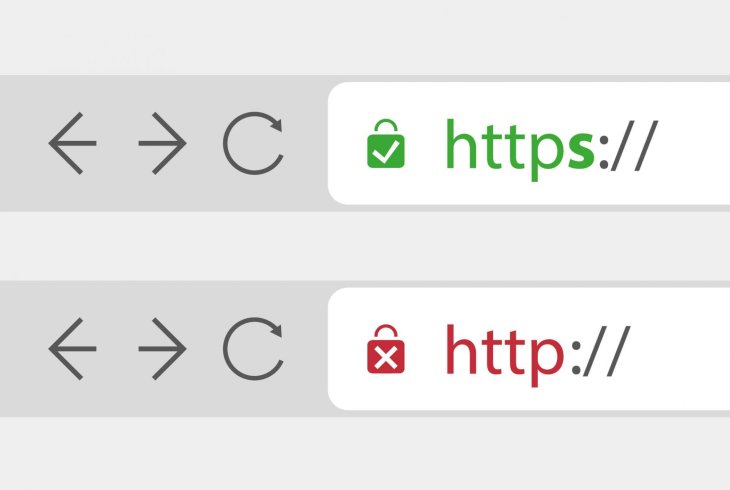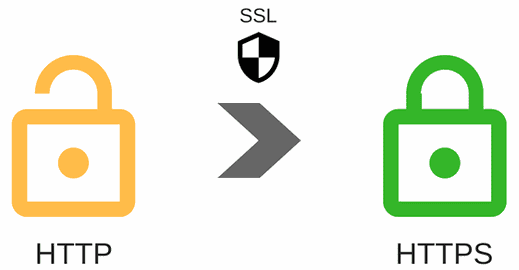HTTPS Vs HTTP: Which One Is More Secure?
SachinSangwan - Sep 30, 2019

Security is an important issue for everyone over the internet. You can increase security if you know about some different type of protocols and connections.
Security is an important issue for everyone over the internet. You can increase security if you know about some different type of protocols and connections. So below are the explanations of HTTP and HTTPS along with their merits and demerits. Let's see what they are.
What's HTTP?
This is short for Hypertext Transfer Protocol. It offers a set of standards and rules that governs how the information gets transmitted across the web. It also provides the standard rules for the web servers and web browsers for communication purpose. HTTP is an application layer network protocol that's built on the top of TCP.

It makes use of hypertext text structure that establishes a logical connection between the nodes that contain text. This is also termed as "Stateless protocol" because each and every command's execution is done separately without the use of references of the previous run commands.
What's HTTPS?
This stands for Hyper Text Transfer Protocol Secure. It is a sophisticated, secure and advanced version of the HTTP, relying on the port number 443 for Data Communication. It encrypts the whole communication with SSL, hence secure transaction. It's a combination of HTTP and TLS/SSL protocol.

It allows creating a secure and encrypted connection between browser and server. This offers bi-directional data security. It helps with protecting potentially sensitive info so that it does not get stolen. In the HTTPS protocol, the SSL transactions are negotiated through the key-based encoding algorithms. Generally, this key is 128 or 40 bits in strength.
Merits of HTTP:
- It is easy to implement HTTP with other protocols on the web or other networks.
- It's quick to access HTTP pages as they are stored on internet and computer caches.
- Platform independent allowing porting across platforms.
- It does not require Runtime support.
- It is usable over the Firewalls. Various global applications are now possible.
- This is not oriented to connection. Thus, the network does not provide overhead for creating and maintaining information and session state.
Merits of HTTPS:
- Mostly, HTTP sites redirect to the sites working over HTTPS. Thus, if people type Http:// in the search bar, it will automatically redirect to https through a secured connection.
- Users can perform secure e-commerce transactions, online banking for example.
- SSL technology provides protection to users and also builds trust.
- Certificate owner's identity is verified by an independent authority, meaning every SSL Certificate has unique and authenticated info about the owner.

Demerits of HTTP:
- Anyone can view the content so there isn't privacy.
- Someone can change or replace the content, hence a big issue with data integrity. Due to this reason, the HTTP is insecure as it doesn't include any encryption methods.
- There is no such clarity about whom you are talking. If anyone tries to intercept the request, that the person can get a username and password.
Demerits of HTTPS:
- The HTTPS protocol steals confidential info from cached pages which are on the web browser.
- The SSL data is encrypted during transmission on the network only. Thus, it cannot clear the text inside the browser memory.
- The HTTPS is able to increase the organization's computational overhead and network overhead.
Featured Stories

Features - Jan 29, 2026
Permanently Deleting Your Instagram Account: A Complete Step-by-Step Tutorial

Features - Jul 01, 2025
What Are The Fastest Passenger Vehicles Ever Created?

Features - Jun 25, 2025
Japan Hydrogen Breakthrough: Scientists Crack the Clean Energy Code with...

ICT News - Jun 25, 2025
AI Intimidation Tactics: CEOs Turn Flawed Technology Into Employee Fear Machine

Review - Jun 25, 2025
Windows 11 Problems: Is Microsoft's "Best" OS Actually Getting Worse?

Features - Jun 22, 2025
Telegram Founder Pavel Durov Plans to Split $14 Billion Fortune Among 106 Children

ICT News - Jun 22, 2025
Neuralink Telepathy Chip Enables Quadriplegic Rob Greiner to Control Games with...

Features - Jun 21, 2025
This Over $100 Bottle Has Nothing But Fresh Air Inside

Features - Jun 18, 2025
Best Mobile VPN Apps for Gaming 2025: Complete Guide

Features - Jun 18, 2025
A Math Formula Tells Us How Long Everything Will Live
Read more

Mobile- Feb 16, 2026
Xiaomi Launches Affordable Tracker to Compete with Apple's AirTag
For users tired of ecosystem lock-in or high prices, the Xiaomi Tag represents a compelling, no-frills option that delivers core functionality at a fraction of the cost.

ICT News- Feb 15, 2026
X Platform Poised to Introduce In-App Crypto and Stock Trading Soon
X has been laying the groundwork for this expansion.

Mobile- Feb 17, 2026
Anticipating the Samsung Galaxy S26 and S26+: Key Rumors and Specs
The Samsung Galaxy S26 series is on the horizon, sparking excitement among tech enthusiasts.
Comments
Sort by Newest | Popular